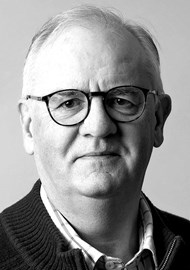
Ray Clarke,
Clinical Sub-dean,
Alder Hey Hospital,
Liverpool, UK.

Prof Liat Kishon-Rabin, PhD,
Dean of Innovation in Teaching & Learning;
Professor of Communication Disorders,
Tel Aviv University, Israel;
President (2021-2023) of the European Federation of Audiology Societies (EFAS).
The worlds of paediatric ORL and audiology are eagerly looking forward to celebrating our subspecialties in 2023. The programme for ESPO in Liverpool next May (www.espo2023.org) is really special – the first face-to-face ESPO get-together in five years. The audiologists gather in Sibenik, Croatia, a few weeks before (www.efas2023.org).
We truly have emerged into the light from the days when we were ‘Cinderella’ specialties. We now attract the brightest and best of our young trainees and residents. This issue celebrates that ‘coming of age’ and gives a preview of what to expect.
Hannah Burns sets the scene with her article on connecting the global ORL community. The COVID pandemic devastated services for all, including children. Hannah reminds us how technology, social media networks, electronic communications – but, more importantly, the sheer enthusiasm and goodwill of the worldwide network of colleagues who care for children and won’t accept second best - came together to weather the storm.
That ‘better together’ philosophy is at the core of caring for children. Clinicians who look after children inevitably liaise closely with families, with specialists in other disciplines, and with each other. Collaborative endeavors and sustained advocacy by public health specialists and audiologists gave us early detection of hearing loss, transforming the specialty of audiology. As Elien Van den Borre and colleagues remind us, hearing screening techniques continue to evolve to ensure detection of late onset of hearing loss during childhood.
Many of the articles that follow highlight how much we have profited from the work of colleagues in the basic sciences. Jennifer Magill and Michelle Wyatt describe innovative techniques in airway surgery – now possible because of developments in endoscopic lens technology, anaesthesia and micro-instrumentation - that would have seemed like far-fetched science fiction a generation ago. Lara Kamal and Karen Avraham show us how geneticists have transformed our understanding of the aetiology of congenital deafness and how this knowledge can assist in selecting more appropriate intervention as early as possible, with surely more to come. Karen Gordon and colleagues provide a synopsis of their lab’s work on developmental neuroplasticity, while highlighting what needs to be done before implementing these data clinically. The scientific discoveries that led to cochlear implantation – now being used for ever-widening indications as explained by Astrid van Wieringen – have brought incalculable benefits and opened up new horizons for children who would in the past have been marginalised and denied the same educational opportunities as their hearing peers.
Steven Powell reminds us that progress is not all about sophisticated and highly technical advances. Obstructive sleep apnoea (OSA) is increasingly recognised, and Steven shows how a careful history with some simple investigations and a common and low morbidity intervention in the form of adenotonsillectomy can bring about easily measurable improvements to quality of life for children and their families. Sensitive and informed understanding and management of balance disorders due to all-too-common and not always recognised conditions – as outlined by Melissa Hazen and her colleagues similarly bring about welcome improvements in children.
Finally, Hannah Emerson’s interview with Su De, and François Simon’s article on Young ESPO should whet appetites for our ESPO get-together. The theme ‘Science, clinicians and families - better together’ sums up what paediatric ORL and audiology are all about.
Keep an eye on the website – www.espo2023.org– and when the Eurovision Song Contest has departed let’s, in the words of John Lennon ‘come together’ in 2023!
Click the links below to see Paediatrics articles:





